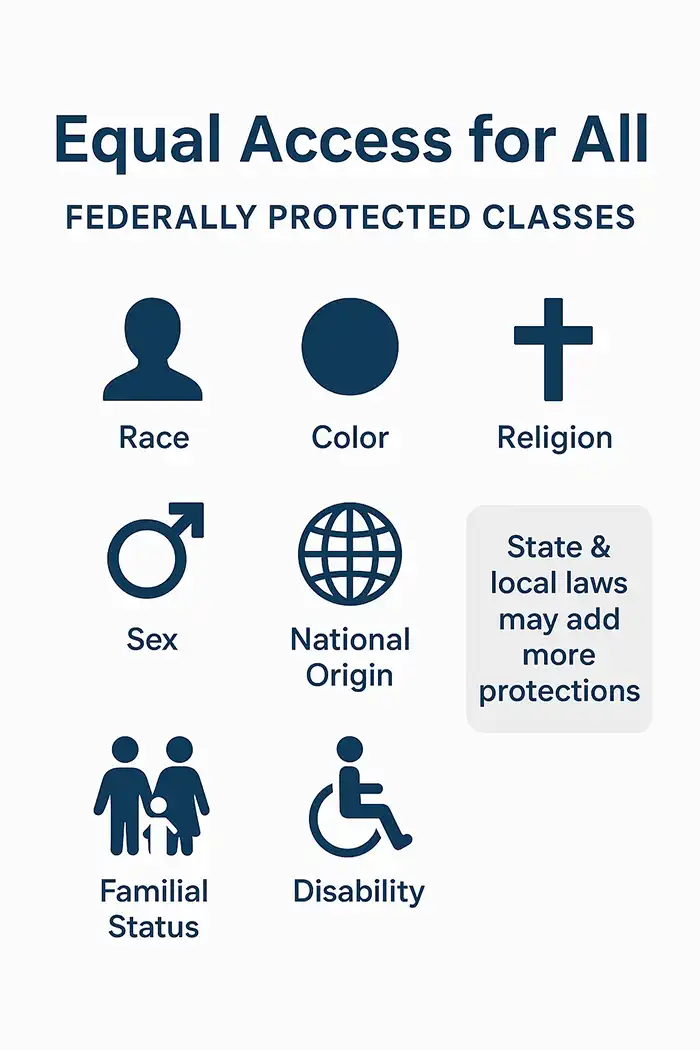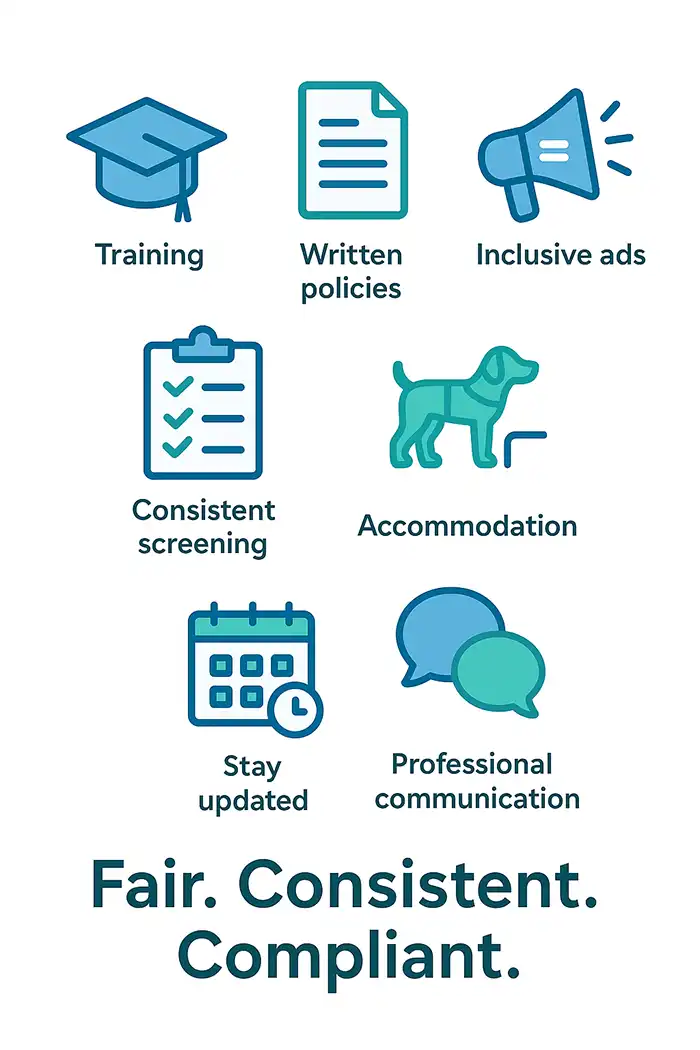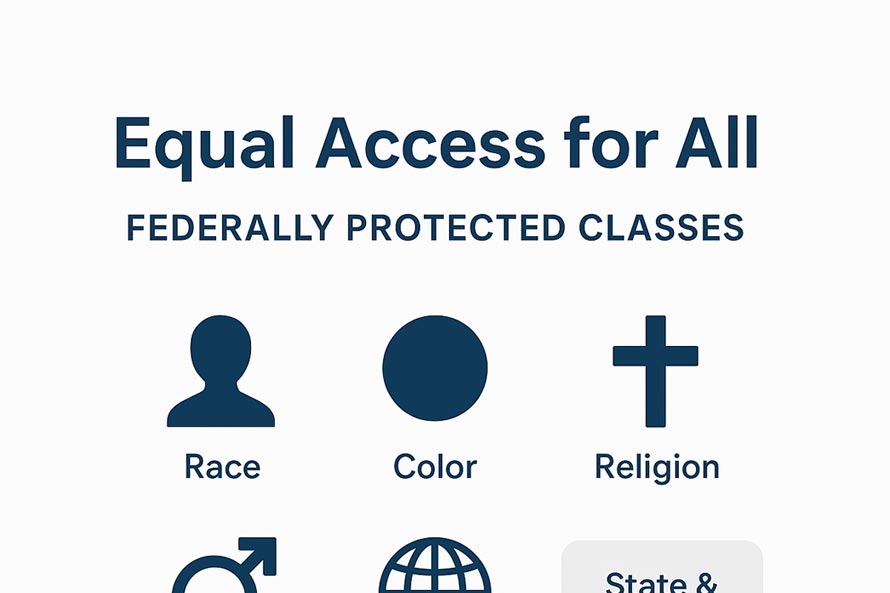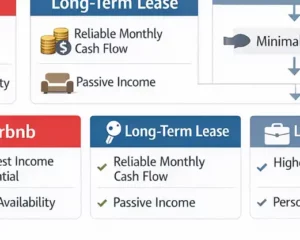Fair Housing Laws That Landlords Need to Know
Navigating the rental market as a landlord comes with more than just finding tenants and collecting rent; it also means understanding and following fair housing laws. These laws are designed to protect renters and buyers from discrimination while ensuring everyone has an equal opportunity to access housing. For landlords and real estate consultants, knowing the rules isn’t just about avoiding legal trouble; it’s about creating a fair, respectful, and inclusive rental environment. Here, we’ll go over essential information on fair housing laws that property owners need to know.
Here are a few things you’ll learn:
Fair housing laws protect renters and buyers from discrimination based on race, color, religion, sex, national origin, familial status, and disability.
The Federal Fair Housing Act (FHA) is the primary law, but state and local laws may add protections like age, marital status, or source of income.
Common violations to avoid include discriminatory advertising, inconsistent tenant screening, refusing reasonable accommodations for disabilities, offering different lease terms based on protected classes, and harassment or intimidation.
There are limited exemptions to the FHA, such as small owner-occupied buildings and certain religious or senior housing, but many local laws do not allow these exemptions.
If discrimination is suspected, individuals can file complaints with HUD, and landlords should respond calmly, cooperate with investigations, and consult legal counsel if needed.
Best practices for landlords: train your team, create clear written policies, advertise inclusively, apply fair and consistent screening criteria, promptly handle accommodation requests, communicate professionally, and stay updated on changing laws.
What Are Fair Housing Laws?
Fair housing laws are rules designed to ensure everyone has equal access to housing without facing discrimination based on certain personal characteristics. There are a few federal laws, along with various state and local laws, that must be met and apply to individuals renting, buying, or applying for a mortgage.
What is the Federal Fair Housing Act?



The main law is the Fair Housing Act (FHA), passed in 1968 as part of the Civil Rights Act. According to the Civil Rights Division, the law prohibits discrimination by direct providers of housing, such as landlords and real estate companies, as well as other entities, such as municipalities, banks or other lending institutions, and homeowners insurance companies whose discriminatory practices make housing unavailable to persons because of:
✔ Race or color
✔ Religion
✔ Sex
✔ National origin
✔ Familial status, or
✔ Disability.
Who is Protected Under Fair Housing Laws?
The various types of housing laws aim to create a level playing field in the housing market. They help prevent discriminatory practices (in advertising, screening, leasing, and property management) and give individuals legal recourse if discrimination occurs.
As mentioned, the federal Fair Housing Act prohibits discrimination based on seven different classes, which are defined as follows:
Race: Protection against discrimination based on race.
Color: Protection against discrimination based on skin color.
National Origin: Includes country of birth, ancestry, or cultural/linguistic heritage.
Religion: Covers all religions, denominations, and beliefs, as well as the choice not to follow any religion.
Sex: Includes gender, gender identity, sexual orientation, and protection from sexual harassment.
Familial Status: Protects families with children under 18, pregnant individuals, or anyone securing custody of children.
Disability: Physical or mental disabilities, including those that substantially limit major life activities, and protections for people associated with individuals with disabilities.
State and local laws often expand these protections to include additional categories such as age, marital status, veteran status, source of income, or political affiliation.
What Are Some Common Violations Landlords Should Avoid?
Even well-meaning landlords can unintentionally violate fair housing laws if they aren’t careful. These laws apply to every stage of the rental process, from advertising to lease renewals, so understanding the most common pitfalls is key. Some examples of discrimination in housing include the following:
1. Discriminatory Advertising
It’s illegal to use language in rental listings that expresses a preference or limitation based on a protected class.
Examples:
“Perfect for singles only” (discriminates against families).
“Christians preferred” (discriminates based on religion).
“No wheelchairs” (discriminates based on disability).
2. Unequal Screening Practices
You must apply the same rental criteria to every applicant.
Examples:
Charging a higher security deposit for tenants with children.
Requiring proof of citizenship from some applicants but not others.
3. Refusing Reasonable Accommodations for Disabilities
Under the Fair Housing Act, landlords must make reasonable accommodations or allow modifications for tenants with disabilities.
Examples:
Denying a service animal in a “no pets” building.
Refusing to install grab bars in a bathroom when requested (at the tenant’s expense if applicable).
4. Offering Different Lease Terms or Conditions
Providing different rental rates, rules, or privileges based on a protected class is illegal. Refusing to rent based on a protected class is also illegal.
Examples:
Charging a higher rent for tenants of a certain national origin.
Allowing only some tenants access to amenities like a pool or gym.
5. Harassment or Intimidation
Any behavior meant to discourage a tenant from living in or enjoying a property based on a protected class is prohibited.
Examples:
Making derogatory comments about a tenant’s religion.
Retaliating against a tenant who files a fair housing complaint.
Are There Any Exemptions to the Fair Housing Act?
Fair housing laws aren’t just about avoiding blatant discrimination; they also outline specific practices landlords must follow to ensure equal access to housing. Understanding these elements helps landlords not only stay compliant but also create a positive rental experience for all tenants. However, there are a few exemptions. Some of these include:
Owner-occupied buildings with four or fewer units (sometimes called the “Mrs. Murphy exemption”).
Single-family homes rented or sold by the owner without a broker, provided the owner owns no more than three such homes at one time.
Housing operated by religious organizations or private clubs that limit occupancy to members, as long as membership isn’t restricted based on a protected class.
Housing for older persons meeting specific requirements, such as 55+ communities.
These exemptions are primarily for the federal laws in place. Some state or local laws may not recognize these exemptions, so it’s important to make sure you’re familiar with what applies to your location.
Handling Complaints and Enforcement
Individuals can file a complaint with the US Department of Housing and Urban Development HUD) if they feel like they’ve encountered housing discrimination. HUD is the federal agency that enforces the Fair Housing Act. Individuals can:
File a complaint online at HUD’s website.
Call HUD’s hotline at 1-800-669-9777.
Mail or email a completed complaint form.
As a landlord or housing provider, receiving a complaint can be stressful, but it’s important to stay calm and respond appropriately. A complaint doesn’t automatically mean you’ve done something wrong; it’s an allegation that will be investigated. Avoid defensive or hostile reactions, especially toward the tenant or applicant who filed the complaint. Make sure to cooperate and, if necessary, consult a lawyer specializing in fair housing or landlord-tenant law.
Best Practices for Compliance With Local, State, and Federal Fair Housing Laws



Fair housing compliance isn’t a one-time box to check; it’s an ongoing responsibility for landlords and property managers. Staying proactive helps you avoid costly mistakes, maintain a good reputation, and foster a rental community where every tenant feels welcome. Here’s how to put compliance into daily practice:
1. Educate Yourself and Your Team
Attend regular training sessions or workshops on fair housing laws. HUD, local housing agencies, and landlord associations often provide free or low-cost resources. Make sure all staff and contractors understand how their actions can affect compliance.
2. Create Clear, Written Policies
Document your advertising, screening, and leasing procedures so every applicant is treated equally. You should also have a reasonable accommodation/modification policy that outlines how tenants can make requests and how you will handle them. Finally, make sure you use consistent application forms and lease agreements to avoid accidental favoritism.
3. Practice Inclusive Advertising
Always use the Equal Housing Opportunity logo and statement in your marketing materials. When posting advertising, focus on property features instead of the “ideal tenant,” and advertise in a variety of media outlets to reach a diverse pool of applicants.
4. Screen Applicants Fairly and Consistently
When going through applications, it’s essential to apply the same rental criteria (credit score, income requirements, rental history) to everyone. It’s also important to avoid questions or requirements that could reveal or target a protected class. Always keep written records of things to show that you’ve based decisions on objective criteria.
5. Respond Promptly to Accommodation Requests
If you receive a reasonable accommodation or modification, it’s essential to treat it seriously. Engage in an interactive dialogue with the tenant to find a workable solution and keep all communication documented.
6. Maintain Professional Communication
When communicating with prospective tenants, try to avoid casual remarks or “small talk” that could be interpreted as biased. Instead, tenant interactions should be business-focused and appropriately documented. It’s also good practice to respond to all inquiries, applications, and maintenance requests in a timely and consistent manner.
7. Stay Updated on the Law
As with any laws, fair housing laws can change, especially at the state and local levels. Try to review and revise policies annually, or subscribe to your local housing authority or landlord association.
Fair housing laws set the standard for how rental properties should be advertised, managed, and maintained. By applying consistent policies and treating all applicants and tenants equally, landlords can protect themselves from costly violations while fostering trust and goodwill in their communities. Whether you’re a new property owner or an experienced landlord, staying informed is essential.
If you’re ready to take the guesswork out of property management and ensure full compliance with fair housing laws, contact First Star Realty today.



